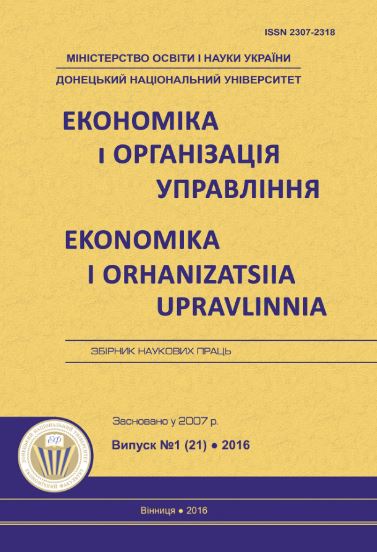Psychological aspects of personnel development in media communications.
Keywords:
staff development, media sphere, psychological features of activity, professional competenceAbstract
The actual problem of development both system of professional qualifications and general formation of modern society information potential in the media communications sphere is definition of the activity features in the media communications sphere, which has psychological or social-psychological determinants. Specifications of their weight and formation psychological competence of experts in the sphere of social communications on the basis of their dominants. The scope of research is psychological features of activities in the media communications sphere and there reflection in expert's professional competence structure. The goal of research is definition of the activity features in the media communications sphere, and formation psychological competence of experts in the sphere of social communications on the their basis. Such methods as structural analysis, generalization and classification were used in this artical. In accordance with the result of structural analysis were founded that the successful performance of professional functions in a considerable extent accived by need of the workers emotional potential preservation . In contrast to the other social professions the phenomenon emotional burnout in the media has certain specifity: loss of the emotional sensitivity, abilities to sympathy, abilities to feel interest to the work and other people are happens not only as a result of the high intensity of contacts but also as a result of the delayed and inefficient feedback. At the same time we can see psychological defense mechanisms and the emasculation of the relation to the work. Provision of improvement formation professional competence in media communications sphere is provided to carry out according to the most powerful psychological features of both communicant and consumer of a media product behaviors proceeding from idea of the three-component personality structure (a cognitive, emotional and effective, practical and effective component) In prospect, the received results give the chance to modernize the professional training system in the media communications sphere by the definition and using of the optimal didactic forms and methods for the development outlined components of psychological competence. Information about the content elements of the expert psychological competence structure tin the media communications sphere can also be used in the process of assessing the professional competence level, professional selection, and all.References
Винтерхофф-Шпурк П. Медиапсихология. Основные принципы / П. Винтерхофф-Шпурк. – Харьков: Изд. Гуманит. университет, 2007. – 288 с.
Giles D. Media Psychology / D. Giles. – Mahwah, NJ; London: Lawrence Erlbaum Associates, 2003. – 334 р.
Harris R. J. A Cognitive Psychology of Mass Communication / R. J. Harris, F. W. Sanborn. – N. Y., London: Routledge Taylor & Francis group, 2014. – 560 р.
Любимов А. Ю. Мастерство коммуникации / А. Ю. Любимов. – М.: КСП+, 2002. – 325 с.
Почепцов Г. История медиа как история систем управления вниманием / Г. Почепцов [Электронный ресурс]. – Режим доступа: http://psyfactor.org/lib/mediacommunication-7.htm
Богомолова Н. Н. Социальная психология массовой коммуникации : учеб. пособ. для студентов вузов / Н. Н. Богомолова. – М. : Аспект Пресс, 2008. – 191 с.
Федоров А. В. Медиаобразование и медиакритика: новый поворот? / А. В. Федоров [Электронный ресурс]. – Режим доступа: http://psyfactor.org/lib/fedorov37.htm
Livingstone S. Media Literacy and the Challenge of New Information and Communication Technologies / S. Livingstone // The Communication Review. – 2004. – № 7. – Р. 3–14.
Dominick J. R. Dynamics of mass communication. Media in the Digital Age / J. R. Dominick. – N. Y.: McGrow Hill, 2005. – 535 р.
Лау Х. Руководство по информационной грамотности для образования на протяжении всей жизни / Х. Лау. – М. : МОО ВПП ЮНЕСКО «Информация для всех», 2007. – 45 с.
Frau-Meigs D. Cultural diversity and global media studies / D. Frau-Meigs // Global Media and Communication. – 2007. – № 3. – Р. 260–266.
Miller T. Media Studies 3.0. / T. Miller // Television New Media. – 2009. – Vol. 10, № 1. – Р. 5-6.
Михалева Г. В. Медиаобразование в Великобритании: история и современность / Г. В. Михалева. – Таганрог : Изд. ЮФУ, 2015. – 224 с.
Пронина Е. Е. Психология журналистского творчества / Е. Е. Пронина ; 2-е изд. – М.: Изд. Моск. ун-та, 2003. – 320 с.
Олешко В. Ф. Психология журналистики : учебное пособие / В. Ф. Олешко. – СПб. : Изд. Михайлова В.А., 2006. – 240 с.
Ушкальов В. В. Місце рефлексії в контексті формування особистісних компетентностей економістів та менеджерів / В. В. Ушкальов // Рефлексивные процессы и управление в экономике: тезисы докл. III Всеукр. науч.-практ. конф. (Севастополь, 26-29 сентября) / НАН Украины, Инт экономики пром.-сти; ред. кол.: Р.Н. Лепа (отв. ред.) и др. – Донецк, 2012. – С. 293–296.

